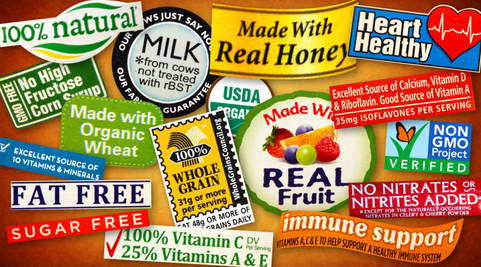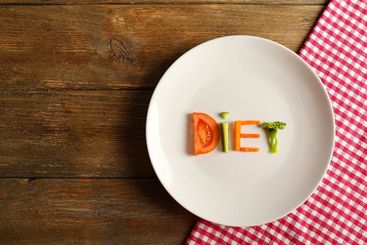|
There is SO much information out there about what we should or shouldn’t eat. Chances are you’ve at some point experienced this food confusion from something you’ve seen or heard on the news, on the internet, or from that health conscious lady at work. You know the one. So what’s real and what’s not? The best course of action is to trust science and reputable research institutions, but that’s not always an option for the newest diet or health foods. What we have to do in most cases is rely on things that have actually worked for people or what we can ourselves break down as true or false. The purpose of today's post is to dissect a small number of the most common misleading terms you’ll see in food and beverage marketing. Natural: No definition, therefore no regulation. In reality, a candy bar could be labeled as “natural” because at some point, most of its ingredients came from a formally “natural”, living thing. Fresh: a little bit more regulated. According to the Food and Drug Association, “The term "fresh," when used on the label or in labeling of a food in a manner that suggests or implies that the food is unprocessed, means that the food is in its raw state and has not been frozen or subjected to any form of thermal processing or any other form of preservation.” Organic: We don’t have enough space here to fully discuss the regulation of this term and it’s impact on the food industry. The biggest point I want to push is that if buying organic is important to you, do it. You might spend a bit more, but it’s likely worth it in the long run. The second, and maybe more relevant, point I want to make is that just because a product says that it’s organic, doesn’t mean it’s automatically healthy. Organic cookies are still cookies; organic Mac ’n Cheese is still noodles and processed cheese. In my opinion, if you want to eat cookies, you might as well just go for the real thing! You can view a list of the Environmental Working Group’s “Dirty Dozen” and “Clean 15” for produce most likely to have a high exposure to pesticides versus those with lower exposure here. Diet/Low calorie/low fat/fat free: Thankfully we’ve wised up to this a bit after the 90s and 2000s. During that time companies removed most or all of the fat from products and replaced it with…SUGAR or artificial sweeteners. Just one of many reason why we’ve arrived at our current obesity epidemic. Thankfully we’ve come back around to the conclusion that fat won’t kill you, in moderation of course! Click here for the American Heart Association’s list of food labeling claims and what they really mean Gluten free: Buckle up for this one. "Gluten free" is a very common term we see on food packaging, beverages, menus, and beauty products. At some point, “gluten free” was equated with health. I’ve seen this on bottles of water, health and beauty products, soap, etc. What is gluten, anyway? According to the Mayo Clinic, gluten is a protein found in wheat, rye, and barley. You’ll find gluten in bread, cereal, pasta, beer, some supplements and medications, processed meat and anything else processed in or around products containing gluten. People diagnosed with Crohn’s disease, celiac disease, and other inflammatory bowel conditions can be highly sensitive to ANY gluten exposure. There are also those who believe that gluten causes widespread inflammation in the body and should therefore be avoided even without a diagnosis. Unsure if you’re sensitive to gluten and don’t want to pay for a very expensive test to determine that? Cut it out of your diet and see what happens; feel better? Great. Stop eating it. No change? Eh, you probably don’t have a sensitivity. Paleo/Keto/(insert some other diet here): Do some of these diets work for some people? Absolutely. Are they sustainable long term? Maybe. I’m not here to attack the resurgence of Paleo and Ketogenic-style diets, just evaluate how those terms can be used to trick consumers in the last 5-10 years. For example, just because a product claims that it contains ketones, doesn’t mean that you’re going to “burn” fat due to those ketones if you’re still eating carbohydrates! If a product claims that it’s “paleo,” it likely just means that it doesn’t contain processed grains/legumes/etc., and again does not automatically make it a health food.
Any other terms you’re curious about? Send us a message! Wondering if what you’re eating is supporting your goals? Set up an appointment with a coach! We can help you set up a plan, stay consistent and accountable. -Coach Laurel Heggernes
0 Comments
Leave a Reply. |
AuthorMi5 Staff Nutrition is integral to success, whether your goals are weight loss, general muscular toning, fat loss, performance, weight gain, or just maintaining a HEALTHY lifestyle. Mi5 nutrition coaching provides customized support for all people and all goals. Sign up today:
Archives
December 2018
Categories |
LOCATION
|
|


 RSS Feed
RSS Feed
